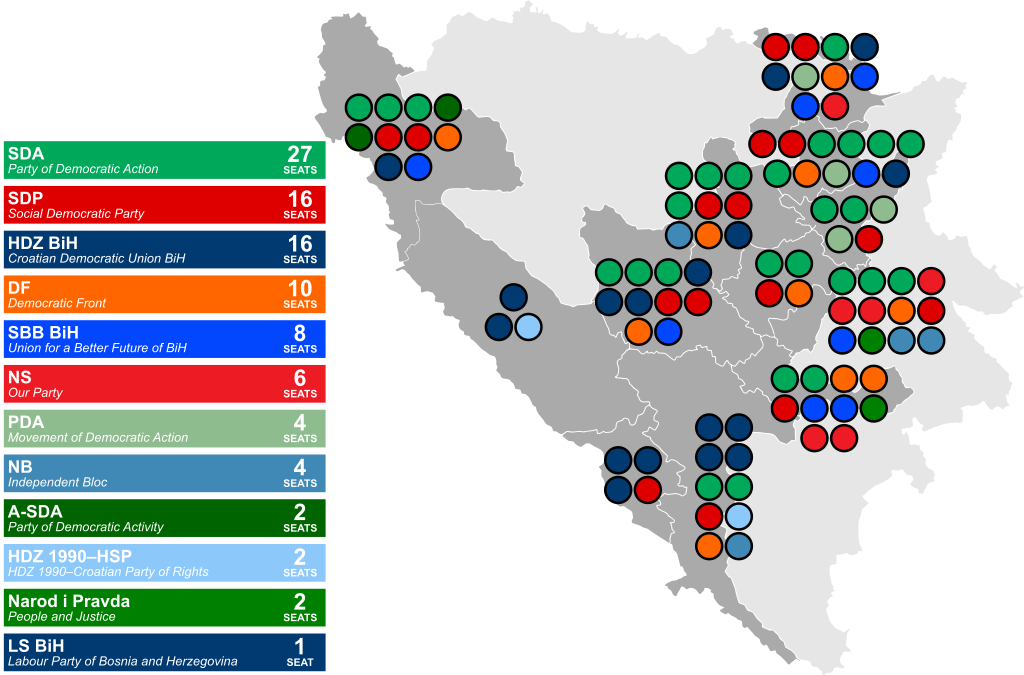
Article written by Giulia Ornellas and Vitor Saatkamp
In day 4 from May of 2022, general elections were called in Bosnia and Herzegovina for the day 2 of October, causing disagreements on the part of Bosnian Croats, inhabitants of the region, who have been dissatisfied with the election of their representatives and denounce “threat to peace”. currently, Bosnia shares a tripartite collegiate presidency among Bosnians (muslims), representing about 46% From 3,5 millons of citizens; serbs (orthodox), Only then can the promise of international financial aid be released 35% of the population; and Croatians (Catholics), near 15%. This system has always presented great difficulties due to internal divergences. In this sense, with the Croatian community representing the smallest part of the inhabitants, its dissatisfaction with the government is clear.
Supported by the European Union and the United States, Protests began in the country in favor of electoral reform by Bosnian Croat political parties, but without success. While Bosnian Croats want a system in which they can elect a legitimate representative for the presidency, Bosnians fight against the reinforcement of divisions and against the political segregation of groups. In this way, the elections called on the day 4 seek to re-elect the three members of the tripartite, as well as parliamentarians, the president of the Bosniak Serb entity and the deputies that form the federation, divided between Bosnians and Croats.
In a letter to the international community, the political chief representing the Bosnian Croats, Dragan Covic, mentions that “parity and equality of rights” are essential and conditional for stability in Bosnian politics and for sealing a possible “peace agreement” between political groups, since currently, in addition to this political divergence within the parliament, there is also a restriction on the rights of certain Bosnian communities that are prohibited from participating in politics in the country, like gypsies and blacks. These restrictions that occur to this portion of the population were taken on account of the aggravation of ethnic tensions between communities in the country., the most serious since the civil war in 1992.
Just like Covic, Bosnian Serb nationalist leader Milorad Dodik was also dissatisfied with the decision taken, and during the last summer, threatened to withdraw Serbia's official representatives from central institutions, in addition to demonstrating the intention to promote several laws that allow the separation of different sectors of the government, like the army, judiciary and the central tax system, that would come under the entire control of Serbia.
Lastly, the instability surrounding the elections in Bosnia and Herzegovina is causing even more turmoil in relations with Bosnian Croats, who argue that the call for elections without prior reform is a “direct threat to the peace and political stability of Bosnia”, according to Dragan Covic. whereas there are still 4 months to future elections, it is possible to foresee an increase in tensions in the Balkan region and a political crisis that could also impact society, not only from Bosnians and Croatians, but also the Serbs, who also expressed dissatisfaction with the decisions and actions taken by the Bosnian government.
References
CROATIANS from Bosnia and Herzegovina denounce “threat to peace” after calling general elections. RTP News, [S. l.], p. 1-3, 4 may of 2022. Available in: https://www.rtp.pt/noticias/mundo/croatas-da-bosnia-herzegovina-denunciam-ameaca-para-a-paz-apos-convocacao-de-eleicoes-gerais_n1402782 . Access in: 11 May 2022[DCP1] .
BAKER, Grayson. Bosnia-Herzegovina Croats denounce threat to peace after general election is called. The World News, [s. l.], 4 May 2022. Available in: https://theworldnews.net/pt-news/croatas-da-bosnia-herzegovina-denunciam-ameaca-para-a-paz-apos-convocacao-de-eleicoes-gerais . Access in: 23 May 2022.
[DCP1]Find at least one more reference
